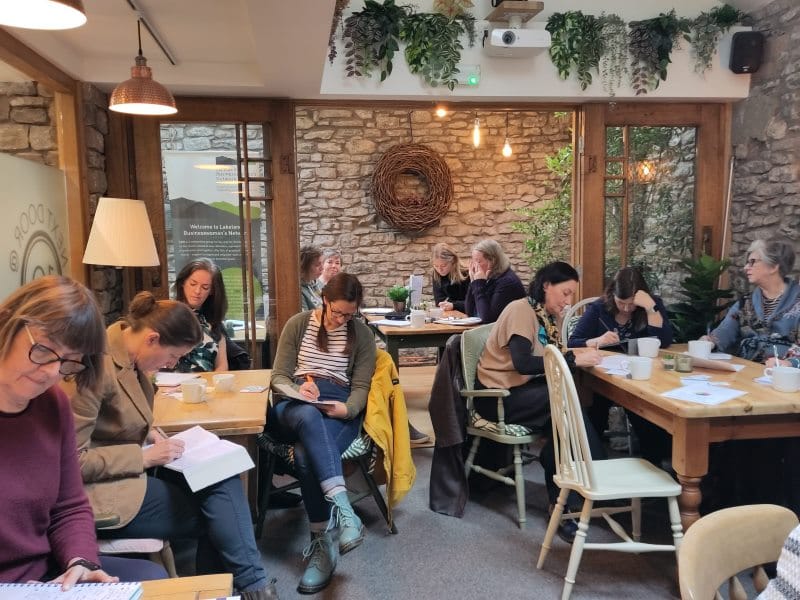What are your favourite things about the current season? Consider all your senses: the smells, sights, sounds, feels (touch) and tastes that you experience. Write for 5 mins using sentences.
This was the prompt I gave everyone at a journalling workshop I delivered recently for Lakeland Businesswomen’s Network. It’s always good to start with something positive and this certainly got everyone’s writing flowing.
Anyone who’s been a client of mine will know how passionate I am about journalling and how it helps me in all aspects of my life, at home and at work. So I’m always delighted to share my story with others and encourage everyone to have a go.
My Story
Journalling has helped me whilst developing my business and setting up Future Fixers CIC, helping to reduce stress, explore solutions and to keep me positive and resilient. During Covid lockdowns it helped me focus on enjoying the moment AND on planning a better future. When relationships with colleagues, friends or family have been difficult, I’ve been able to vent my frustration and work out my emotions on the page rather than face to face. And whilst seriously ill recently I was able to keep a gratitude journal which helped me concentrate on what I had, rather than what I didn’t have, plus what I could control rather than what was out of my control. More than anything, journalling has helped me find my voice and tell my stories.
As Greta Solomon wrote in ‘Heart, Sass and Soul’ after her mother died: Writing is a helpful friend….A safe space to open my heart……and it ‘helped me to chart a new path.
There are multiple benefits to journalling. It’s even been said that it can boost your immunity by allowing you to process your emotions. Whatever your goals are in life, whether you are focussed on your career, health and wellbeing, relationships or lifestyle then putting pen to paper can help you become more intentional and likely to achieve what YOU want.
How to Start
Looking back in my first journal (yes I do keep them!) I’d used a mixture of ‘free writing’ or ‘stream of thought’ and some prompts. One prompt that I remember helping in the early days was this:
Imagine you’re meeting yourself for the first time and write down how you would introduce yourself. Don’t read it back, don’t correct as you go, just keep writing until you run out of things to say and then stop.
Do it again tomorrow, and the next day and the day after that, each time starting where you left off until it becomes a habit. It only needs to be 5 minutes each day.
Never judge what you write. There’s no such thing as perfect journalling. It is self-expression NOT self-scrutiny and ‘correction’ that brings healing and happiness said Julia Cameron in The Artist’s Way.
Julia Cameron also insists that ‘morning pages’ are best, but as my journalling has developed I find that clearing my head just before I go to bed works for me, and helps me sleep. My advice is to experiment, stay flexible and don’t worry if you ‘miss’ a session. Expect to have days off when you don’t feel like writing.
This brings me to the prompt I ended the session with:
How do you want to FEEL at the end of this season?
What do you NEED to do to make this happen?
You need to dig a bit deeper for this than for the first prompt, and some people struggled. But with perseverance, journalling helps us to understand ourselves better, tap into our feelings and care for ourselves more.
So what are you waiting for?
So what are you waiting for?
If you want to start, or to develop, your journalling practice, why not try some of the prompts above and sign up to our newsletter here for details of upcoming journalling workshops.
Remember, every answer is inside you 😊
Every answer is inside you.
Happy journalling,
Karen x

